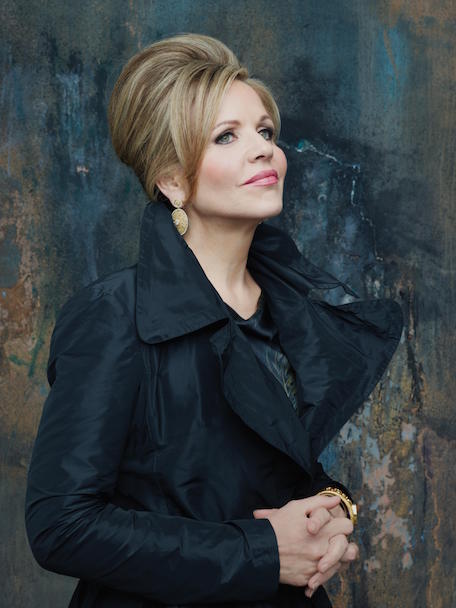
A bevy of musical beauties
Sweeping onstage in a bright red gown and yards and yards of a similarly electrifyingly colored stole, Renee Fleming was greeted by exuberant applause from the Cal Performances’ audience at Zellerbach Hall. When the fervent admiration died down, she remarked that she had always held that when her gown got more applause than her singing she would retire. The applause that greeted her dress was almost that, she implied, tilting her hand one way and then another, like a scale settling in.
The truth is, though, by the time the second half of the recital opened, when she appeared in that blaze of red, Renee Fleming could have walked on stage wearing a bath mat, snorkeling gear and polka dot flippers and the audience would have been equally thrilled.
Considered one of America’s favorite divas, Fleming is not only a celestial singer she is also a consummate performer. Gracious, intelligent, humorous and warm. And for Saturday’s performance she brought all of that considerable charm to her singing.
The first half of the program, for which she dressed in a somber black, opened with Schumann’s “Frauenliebe und –leben”. An excellent opening, which allows the singer to unfold the voice slowly, its emotional range while wide – moving from desire to distress to exaltation to grief – remains measured and contained. Its narrative, which is that of a woman’s life, has a historical appeal but falls in a slightly uncomfortable range for contemporary women’s sensibility. The 19th-century text was written by a man, of course. And the musical setting, fiercely Romantic, bears some of that textual burden. It carries, in contrast, the allure of the period’s art song, a kind of simplicity of intent – not a bad thing – and unwavering melodic grace.
The songs allowed Fleming to display her sweetest notes like those at the beginning of “Süßer Freund” (Sweet friend), where she hung on to the opening vowels, allowing the sound to resound achingly in the air.
It was in the following set of songs by Rachmaninoff that Fleming’s voice found its home in the emotional and musical dissonances and the driving passions that characterize the Russian composer. Midway in the set, pianist Olga Kern presented an unexpected addition to the concert, introducing and playing “White Lilacs,” a piano transposition of a song of the same title that allowed for a shining moment of solo pianistic virtuosity.
Kern came to international attention in 2001: she became the first woman in over 30 years to receive the Nancy Lee and Perry R. Bass Gold Medal in the 11th Van Cliburn International Piano Competition; she also tied for first place. Throughout the concert, the Russian pianist was a paragon of musical sensitivity and vigor.
The set closed with the ecstatic “Spring Waters,” the two musicians ending the piece with a complex amalgam of jubilance and longing: “Spring is coming, spring is coming!” the soprano sings. And the listener understands the moment after a hard winter when the natural world bathes our snowy desperation in the promise of sun and warmth.
In the second half of the program – that of the red gown – singer and pianist presented a set of songs by American jazz composer Patricia Barber and a set of three songs from Rodgers and Hammerstein’s The King and I.
Nestled between the two were four songs by Richard Strauss, which were a last minute addition to the program. In her introduction to the songs, Fleming stated that she always sang Strauss, so important was the composer’s work to her vocal artistry. And the songs showed that, especially “Allerseelen,” which uses tenderness to refashion its underlying passionate intensity into nostalgic yearning. Likewise “Ruhe, meine seele” asks for both grandeur and contemplation. These emotionally complex songs, like the Rachmaninoff, seem to border on operatic arias, depending on the dynamic choices of the singer. Complexity seems a proper home for Fleming, both dynamically and tonally. Is that what hovers around her voice giving luster to its sweetness?
The Rodgers and Hammerstein songs were an instance of nostalgia for growing up in America when young would-be singers knew all those melodic and narrative songs born on Broadway. Musicals, Fleming reminded us, were not miked then, and both the singers and the songs seemed closer to a classical tradition. Fleming encouraged the audience to join in on “I Whistle a Happy Tune,” confessing that she couldn’t whistle. But those who could and did joined in lustily and on pitch, giving their all for an artist they clearly adored.
As for the Patricia Barber. Opera singers and jazz. That’s a hard one. It’s not that opera singers can’t sing jazz, opera singers can sing anything beautifully. And Fleming’s singing is gorgeous, but there’s something more intangible in the difference of the two forms. The years of discipline and control behind creating the particular beauty of the bel canto voice run against the essential nature of jazz, which exults in a rawer quality of voice, placing character before beauty. Or something like that. Let’s say, the discipline of jazz places its attention elsewhere.
The Barber song set and the Rodgers and Hammerstein had me thinking about the differences between these various vocal forms, and I had thrown in my lot with the “opera singers should really only sing opera” school of thought, until the final song. After encores of “O mio babbino caro” and an audience sing-along of “I Could Have Danced All Night,” Fleming closed the night with “Danny Boy.” The plangent loveliness of this popular ballad set to a folk tune put the dispute on hold.
Opera singers can sing anything.
– Jaime Robles
Photo of Renee Fleming by Andrew Eccles – Decca.
